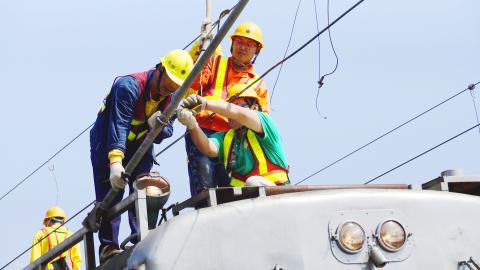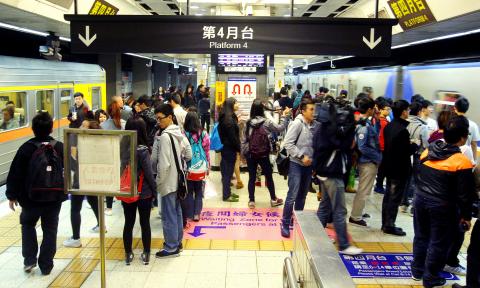Deputy Minister of Transportation and Communications Frank Fan (范植谷), who doubles as Taiwan Railways Administration (TRA) director-general, said yesterday that he and the administration would not dodge their responsibilities over mass train delays a day earlier.
Fan was referring to the delay of 138 trains, affecting more than 60,000 passengers, as a result of broken electric wires on a section of railway between Jhongli (中壢) and Yangmei (楊梅).
The problem occurred at 8:37am on Friday, the first day of the three-day 228 Memorial Day long weekend, when an overhead power line on the electrified rail system at Pusin Station (埔心) was sliced by the pantograph — the equipment on the roof of a train that collects power from an overhead cable — on a fast-moving train.

Photo: Lee Jung-ping, Taipei Times
The administration originally planned to resume operations on the track at 7:30pm on Friday. However, the resumption of services was postponed twice and normal operations were only resumed yesterday morning.
Fan yesterday held a press conference at the Taipei Railway Station to explain the incident and he bowed to apologize for the inconvenience caused.
Minister of Transportation and Communications Yeh Kuang-shih (葉匡時), who attended a TRA briefing later, also apologized for the incident, describing it as “a most unfortunate circumstance.”

Photo: CNA
He instructed that a full review of the refund system should be carried out in response to calls from the public.
Under the administration’s existing refund policy, only passengers on express trains can claim a full refund for a train delay of at least 45 minutes, while travelers on slower trains are not covered by the refund policy.
A TRA safety commission has started a probe into the incident and the investigation report may be released tomorrow.
In an unprecedented move, the TRA mobilized 52 technicians and five vehicles on Friday for an overnight repair job to replace 1.5km of electric cable at a cost of NT$15 million (US$495,210).
Fan said that the number of TRA passengers has risen every year, averaging more than 600,000 per day last year, with the number ballooning to 880,000 during the Lunar New Year holiday.
The nation’s railway infrastructure faces problems due to a lack of maintenance staff and dilapidated electric cables, Fan said.
The Western Line went electrical in 1979 and the electric cables usually have a life span of between 16 and 20 years. The cables at the Pusin Station have not been changed for 30 years. It is known that some of the electric cables on the Western Line are 34 years old.
The administration has replaced the cables between Keelung and Jhunan (竹南) in northern Taiwan, leaving 476km of old electric cables on the Western Line, and is aiming to complete the replacement of a further 22km of cables this year.
The TRA said it would need a budget of NT$2.08 billion over five years to replace all the old cables.

The Ministry of the Interior (MOI) is to tighten rules for candidates running for public office, requiring them to declare that they do not hold a Chinese household registration or passport, and that they possess no other foreign citizenship. The requirement was set out in a draft amendment to the Enforcement Rules of the Public Officials Election and Recall Act (公職人員選舉罷免法 ) released by the ministry on Thursday. Under the proposal, candidates would need to make the declaration when submitting their registration forms, which would be published in the official election bulletin. The move follows the removal of several elected officials who were

The Republic of China (ROC) is celebrating its 114th Double Ten National Day today, featuring military parades and a variety of performances and speeches in front of the Presidential Office in Taipei. The Taiwan Taiko Association opened the celebrations with a 100-drummer performance, including young percussionists. As per tradition, an air force Mirage 2000 fighter jet flew over the Presidential Office as a part of the performance. The Honor Guards of the ROC and its marching band also heralded in a military parade. Students from Taichung's Shin Min High School then followed with a colorful performance using floral imagery to represent Taiwan's alternate name

FOUR DESIGNATED AREAS: Notices were issued for live-fire exercises in waters south and northwest of Penghu, northeast of Keelung and west of Kaohsiung, they said The military is planning three major annual exercises across the army, navy and air force this month, with the navy’s “Hai Chiang” (海強, “Sea Strong”) drills running from today through Thursday, the Ministry of National Defense said yesterday. The Hai Chiang exercise, which is to take place in waters surrounding Taiwan, would feature P-3C Orion maritime patrol aircraft and S-70C anti-submarine helicopters, the ministry said, adding that the drills aim to bolster the nation’s offshore defensive capabilities. China has intensified military and psychological pressure against Taiwan, repeatedly sending warplanes and vessels into areas near the nation’s air defense identification zone and across

A Chinese takeover of Taiwan would severely threaten the national security of the US, Japan, the Philippines and other nations, while global economic losses could reach US$10 trillion, National Security Council Deputy Secretary-General Lin Fei-fan (林飛帆) wrote in an article published yesterday in Foreign Affairs. “The future of Taiwan is not merely a regional concern; it is a test of whether the international order can withstand the pressure of authoritarian expansionism,” Lin wrote in the article titled “Taiwan’s Plan for Peace Through Strength — How Investments in Resilience Can Deter Beijing.” Chinese President Xi Jinping’s (習近平) intent to take Taiwan by force